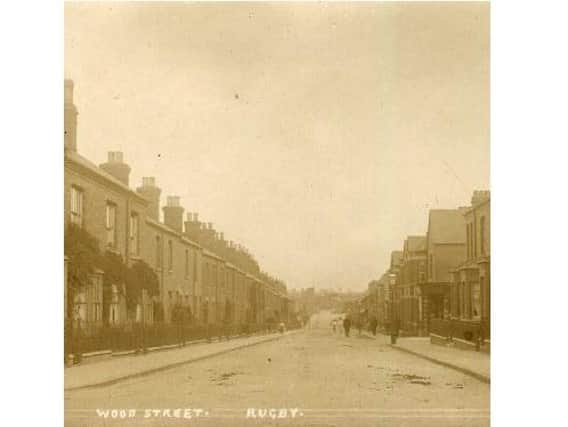Former Advertiser reporter remembers Trevor White, a great Rugby man who died before his time


What's in a name, a certain celebrated son of leafy Warwickshire once wondered.
Indeed. But perhaps more to the point, how does that name come about in the first place?
Advertisement
Hide AdAdvertisement
Hide AdTake this mundane example. Wood Street, Rugby. I can only imagine it was named after someone called Wood, because it must have been many a long year since there were any large clumps of trees in that area.
All right, there may once have been a primaeval forest sweeping down the hill that would one day become the settlement of Rugby, but as our Celtic forebears had no written language, we have no way of knowing.
My earliest memory of Wood Street was the smell of the gasworks, once whiffed, never forgotten.
The Churchover bus always stopped to pick up passengers opposite this grimy edifice, thus facilitating a good few nostrils’ worth of fumes before that Midland Red diesel engine once
Advertisement
Hide AdAdvertisement
Hide Adagain sputtered into life to go under the Newbold Road railway bridge.
Ah yes, the gasworks. Rotten eggs… and then some.
My parents lived in Poplar Grove when they first married, and so my elder sister attended Wood Street school, where she remained even after the family had departed for Churchover.
The headmistress in those days was a Mrs White, and there will still be Rugby people who will have fond memories of their schooldays at Wood Street.
A while back I had a long phone conversation with Colin White, her surviving son, who now lives in Braunston. I say surviving because Colin’s brother Trevor died in a road accident in June, 1968.
Advertisement
Hide AdAdvertisement
Hide AdTrevor was a man of many talents and a rising star in the world of local politics. Elected to Rugby District Council at the age of 23, he was at that time the youngest Liberal councillor in Britain.
A much-respected teacher at Dunsmore School, he was a keen sportsman and very much a leading light in the town’s public life. But tragedy struck when, returning home from a school trip to Inverness, Trevor’s car was involved in a head-on crash with another vehicle. He was killed instantly.
As a reporter on the Rugby Advertiser, I covered the funeral service at St Andrew’s Church and interment at Clifton Road cemetery.
Hundreds of people attended to say farewell to a faithful son of Rugby who had been called before his time.
Advertisement
Hide AdAdvertisement
Hide AdHis sibling Colin White was employed at Rootes, Ryton-on-Dunsmore, for many years. The brothers’ uncle was Gordon Tew, who worked for the Rugby Advertiser most of his life, and a man I remember well.
Not long after I had interviewed Rugby band leader Tom Ward, I was having a conversation with Gordon when I let it be known that after meeting Tom, I’d developed an interest in the dance band music of the 1930s and 40s.
On hearing this, Gordon kindly said he would give me his collection of 78rpm records, which I still have in my possession. The thing I remember about that exchange was him telling me off for calling him by his Christian name.
I was, after all, a young whippersnapper, so it had to be ‘Mr Tew’ from then on. Those were the days.
Advertisement
Hide AdAdvertisement
Hide AdThere was a tragic coincidence on the day Trevor White died - June 8, 1968 - for this was the date that Robert Kennedy was assassinated in America, almost five years after his brother had met the same fate.
Councillor White, who was 36, and had been deputy mayor to Ray Holder the previous year, lived with his parents in Eastlands Road.
They were on the way back from a week’s holiday in Blackpool and received the tragic news from their younger son Colin when they returned home later in the afternoon.
Trevor White was educated at Eastlands, Lawrence Sheriff and Rugby Schools, and went on to Trinity Hall, Cambridge, where he graduated in English and Law.
Advertisement
Hide AdAdvertisement
Hide AdHe qualified as a solicitor after being articled with Seabroke-Harris in Rugby for three years, but his first love was teaching, and he became a master at the old Eastlands Secondary Technical School, and then moved to Dunsmore when it opened in 1958.
Those favoured by the gods die young, goes the saying, and never was that more true than in the case of Trevor White, greatly mourned throughout the Rugby community.
I came across his grave in Clifton Road cemetery last year while trying to locate the last resting place of a baby sister I never knew. The stone is engraved with a line from Laurence Binyon’s classic First World War poem, a fitting epitaph to a true son of Rugby.
We can only guess at what the future would have held for Trevor White.
Advertisement
Hide AdAdvertisement
Hide AdMy guess is that he was undoubtedly destined for greater future political glory, perhaps standing – and possibly winning – Rugby as a seat for the Liberals.
Labour’s Bill Price represented the town for many years, and certainly had the popular touch, but I think Trevor White definitely would have given him a run for his money. Sadly, we shall never know.
John Phillpott’s third book, Go and Make the Tea, Boy! was published during the summer by Brewin Books of Redditch.